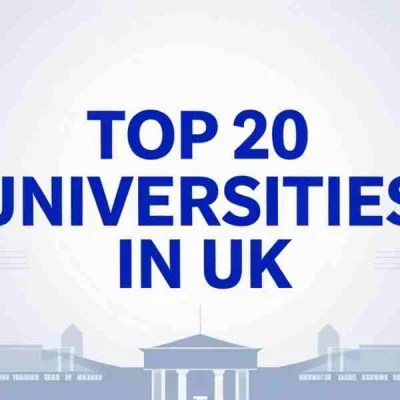Studying MBA in UK: Top Colleges, Cost, Eligibility, and More
Table of Contents
Pursuing an MBA in the UK is a transformative experience that provides international students with a globally recognized degree, access to top-tier universities, and extensive networking opportunities. The UK is home to some of the world’s most prestigious business schools, including London Business School, University of Oxford (Saïd Business School), and University of Cambridge (Judge Business School), all of which offer cutting-edge curricula designed to develop leadership and strategic thinking skills.
A major advantage of studying for an MBA in UK is its shorter duration, with most full-time programs lasting just 12-18 months, allowing students to return to the workforce faster compared to traditional two-year MBA programs. For international students, including those from India, the UK offers financial support through scholarships and a post-study work visa, allowing graduates to stay in the country for up to two years to seek employment. This guide covers everything you need to know about pursuing an MBA in the UK, including top colleges, costs, eligibility criteria, specializations, scholarships, and the application process.
Highlights
| Feature | Details |
| Total MBA Colleges in the UK | Over 150+ institutions offer MBA programs across various specializations. |
| Top Universities for MBA in the UK | London Business School, Imperial College Business School, University of Cambridge (Judge), University of Oxford (Saïd), Warwick Business School, Manchester Business School, etc. |
| Popular MBA Specializations | General Management, Finance, International Business, Healthcare Management, Marketing, Supply Chain, Technology Management, Entrepreneurship, etc. |
| MBA Duration | Full-time MBA: 12–18 months Part-time MBA: 2–4 years Executive MBA (EMBA): 2 years (for working professionals) |
| MBA Cost in the UK | Tuition fees range from INR 10 L to INR 40 L+ (varies by university and program type). |
| Living Expenses in the UK | Estimated at INR 10 L to INR 15 L per year, depending on location (London is more expensive). |
| Entrance Exams for MBA in the UK | GMAT, GRE (some universities waive GMAT for experienced candidates). |
| Scholarships Available | Chevening Scholarships, GREAT Scholarships, Commonwealth Scholarships, University-specific scholarships (LBS, Oxford, Cambridge). |
| Post-MBA Job Opportunities | MBA graduates from UK universities can work in sectors like Consulting, Finance, Tech, Healthcare, and Startups with an average salary of £50,000–£100,000 per year. |
| Stay-back Visa Options | Graduates can stay in the UK for up to 2 years under the Graduate Route Visa to find employment. |
Top 7 MBA Colleges in UK
Pursuing an MBA in the United Kingdom offers a blend of prestigious education, diverse cultural experiences, and expansive professional opportunities. The UK is home to several top-tier business schools renowned for their rigorous curricula, esteemed faculty, and strong industry connections. Below is a detailed overview of the top 7 leading MBA colleges in the UK, including their QS Global MBA Rankings for 2025, tuition fees, program durations, and other important details:
| University | QS Global MBA Ranking 2025 | Tuition Fees (GBP) |
| London Business School | 5th globally, 1st in Europe | £109,700 |
| University of Oxford (Saïd Business School) | 13th globally | £71,440 |
| University of Cambridge (Judge Business School) | 15th globally | £64,000 |
| Imperial College Business School | 21st globally | £61,500 |
| University of Edinburgh Business School | 95th globally | £35,900 |
| Alliance Manchester Business School | 48th globally | £47,000 |
| Warwick Business School | 32nd globally | £49,950 |
MBA in the UK: Eligibility Criteria for Indian & International Students
Pursuing an MBA in the UK offers global exposure, world-class education, and enhanced career prospects. However, applicants must meet certain eligibility criteria to secure admission. Indian and international students are typically required to hold a recognized bachelor’s degree, have relevant work experience, and demonstrate proficiency in English through standardized tests like IELTS or TOEFL. Some top universities may also require GMAT or GRE scores, and additional application components such as an SOP, letters of recommendation, and an interview process.
Since admission criteria vary across universities and programs, students must thoroughly review specific requirements before applying. Below is a comprehensive breakdown of the key eligibility criteria for pursuing an MBA in the UK:
| Eligibility Criteria | Details |
| Academic Qualification | A recognized bachelor’s degree from an accredited university with a strong academic record (equivalent to a UK 2:1 honours degree for top universities). Some institutions may accept a 2:2 classification for candidates with significant work experience. |
| Work Experience | Most universities require at least 2-3 years of full-time professional work experience in a managerial or leadership role. Some universities may waive this requirement for exceptional candidates with a strong academic record or entrepreneurial background. |
| English Language Proficiency | IELTS: Minimum overall 6.5 – 7.0 (with no section below 6.0). TOEFL iBT: 90-100+ (varies by institution). Some universities may waive this requirement if the applicant has completed previous education in English. |
| GMAT/GRE | Some top-tier business schools (e.g., London Business School, Oxford Saïd, Cambridge Judge) require a GMAT score of 600+ or an equivalent GRE score. However, many universities have waived GMAT/GRE requirements, especially for candidates with strong work experience. |
| Statement of Purpose (SOP) | A well-structured SOP or personal statement highlighting career goals, leadership qualities, and reasons for choosing the UK for an MBA. |
| Letters of Recommendation (LORs) | Typically 2 letters of recommendation from academic or professional referees, emphasizing the applicant’s strengths, achievements, and leadership potential. |
| CV/Resume | A professionally crafted CV/resume showcasing work experience, leadership roles, academic achievements, and extracurricular activities. |
Best MBA Specializations in the UK: Which One to Choose?
Choosing the right MBA specialization in the UK is crucial for career advancement, as it determines job opportunities, salary prospects, and industry relevance. The UK offers a variety of highly sought-after MBA specializations tailored to the evolving business landscape. Some of the most in-demand MBA specializations in the UK include Finance, Marketing, International Business, Human Resource Management, Entrepreneurship, Healthcare Management, and Business Analytics.
Among these, Finance and Marketing remain the most popular due to high industry demand, lucrative salary packages, and global career opportunities. Below is a detailed breakdown of the top MBA specializations in the UK, their focus areas, and career prospects:
| MBA Specialization | Key Focus Areas | Career Prospects | Average Salary (GBP/Year) |
| Finance | Financial management, investment analysis, mergers & acquisitions, risk management, banking, and corporate finance. | Careers in investment banking, financial consultancy, corporate finance, hedge funds, and asset management. | £55,000 – £85,000 |
| Marketing | Branding, digital marketing, market research, consumer behavior, advertising strategies, and social media marketing. | Jobs in brand management, digital marketing, market research, content strategy, and sales management. | £50,000 – £75,000 |
| International Business | Global business operations, cross-cultural management, international trade, and global market strategies. | Careers in multinational corporations, international trade, export management, and global supply chain management. | £52,000 – £80,000 |
| Human Resource Management | Employee recruitment, performance management, organizational behavior, training & development, and labor relations. | HR manager, talent acquisition specialist, employee relations consultant, and training & development manager. | £45,000 – £70,000 |
| Entrepreneurship | Startups, venture capital, innovation, business development, strategic planning, and leadership. | Startup founder, business consultant, venture capital analyst, or corporate strategist. | £50,000 – £100,000+ (depends on business success) |
| Healthcare Management | Healthcare policy, operations management, healthcare finance, patient care administration, and quality improvement. | Careers in hospital administration, healthcare consulting, pharmaceutical management, and policy advising. | £50,000 – £80,000 |
| Business Analytics | Data science, predictive analytics, statistical modeling, machine learning, and business intelligence. | Business analyst, data scientist, operations manager, and financial analyst roles. | £55,000 – £90,000 |
Scholarships for MBA in the UK
Pursuing an MBA in the UK can be a significant financial investment, with tuition fees ranging between £30,000 and £90,000 depending on the university. However, several MBA scholarships in the UK are available to help international students, including Indian students, offset the costs. These scholarships are offered based on academic excellence, leadership potential, financial need, and contributions to specific fields such as entrepreneurship or sustainability.
Some of the most prestigious MBA scholarships in the UK include the Commonwealth Scholarship, Essex MBA Dean’s Award, Alliance Manchester Business School Scholarships, the Pershing Square Scholarship at Oxford Saïd Business School, and the Skoll Scholarship. Below is a comprehensive breakdown of the top MBA scholarships in the UK and their key details:
| Scholarship Name | Eligibility Criteria | Funding Coverage | Applicable Business Schools |
| Commonwealth Scholarship | Open to students from Commonwealth countries who demonstrate financial need and academic excellence. | Covers full tuition fees, living expenses, airfare, and research grant. | Various UK universities, including Oxford, Cambridge, London Business School, and Manchester Business School. |
| Essex MBA Dean’s Award | Open to international students with strong academic credentials and leadership experience. | Offers a tuition fee discount of up to 100%. | University of Essex Business School |
| Alliance Manchester Business School Scholarships | Awarded to outstanding candidates with excellent academic records and leadership potential. | Partial to full tuition fee coverage. | Alliance Manchester Business School |
| The Pershing Square Scholarship | For students applying for Oxford’s 1+1 MBA program (MBA + Master’s in another field). | Covers full tuition fees, living expenses (~£17,668 per year), and networking opportunities. | Oxford Saïd Business School |
| The Skoll Scholarship | Focused on social entrepreneurship, available at the Skoll Centre for Social Entrepreneurship at Oxford. | Covers full tuition and partial living expenses. Also provides access to entrepreneurial mentorship and leadership programs. | Oxford Saïd Business School |
| Chevening Scholarship | Open to high-achieving professionals with leadership potential. | Covers full tuition, travel expenses, and monthly stipends. | Various UK business schools, including LBS, Warwick, and Imperial. |
| Great Scholarships UK | For students from India, China, Malaysia, and other countries, awarded based on academic excellence. | Offers £10,000 towards tuition fees. | Offered by University of Birmingham, Cranfield, Nottingham, and more. |
| Cambridge MBA Scholarship | Open to academically strong candidates applying to the Cambridge Judge Business School MBA. | Partial tuition fee waivers of up to £25,000. | Cambridge Judge Business School |
Conclusion
The UK remains a top destination for MBA aspirants due to its world-class education system, shorter program duration, and strong employment opportunities. Moreover, the availability of scholarships, financial aid, and flexible visa options make studying in the UK more accessible for international students. The post-study work visa further enhances job prospects by allowing graduates to gain hands-on experience in the UK job market. Whether you’re looking to advance your career, switch industries, or start your own venture, an MBA from a UK university can be a steppingstone to achieving your professional aspirations. By carefully selecting the right business school, meeting admission requirements, and preparing a strong application, you can maximize your chances of securing a place in one of the UK’s top MBA programs.
Frequently Asked Questions
Is an MBA in the UK worth it for Indian students?
Yes! The shorter duration (1 year), globally recognized degree, high ROI, and job opportunities in top firms make it an attractive choice.
Do UK MBA programs require work experience?
Most top B-schools require 2-5 years of experience, but some universities offer MBA for freshers.
Is GMAT compulsory for MBA in the UK?
Not always! Many universities offer MBA without GMAT if candidates have strong work experience or academic records.
Can I work while studying MBA in the UK?
Yes, students can work up to 20 hours per week during semesters and full-time during breaks under the UK student visa rules.
What is the average salary after MBA in the UK?
MBA graduates can earn between £50,000–£100,000 per year based on specialization and prior experience.
Which MBA universities in the UK don’t require GMAT?
Some universities like University of Central Lancashire, University of Reading (Henley), University of Liverpool, and Durham University offer MBA without GMAT.







